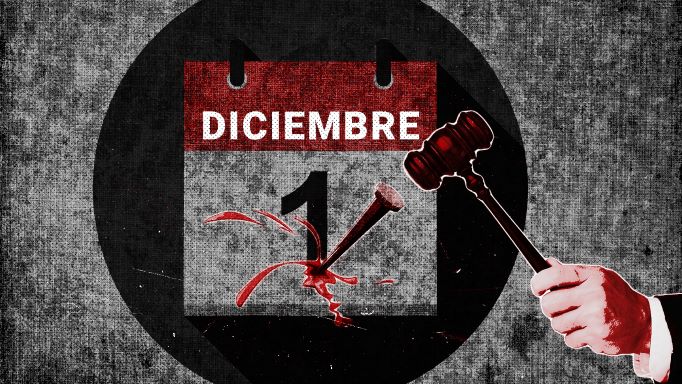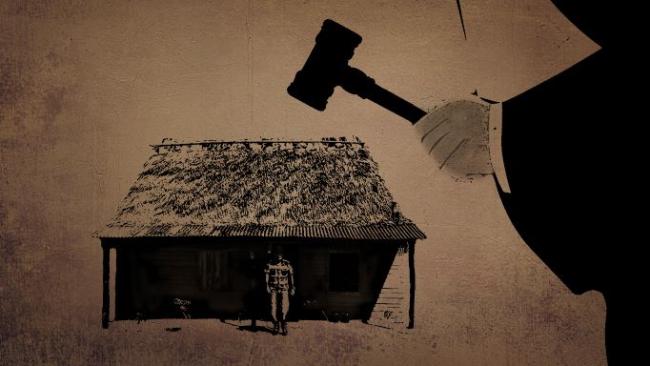On December 1, a new Penal Code comes into force in Cuba which, although as repressive as the one still in place, has been legally fine-tuned with respect to its predecessor, which indicates that the regime does not foresee medium or long-term solutions to the problems that most concern the population, including housing, or changes in the way dissent is handled.
Proof of this is that the new Code not only maintains the criminalization of homeless Cubans (mainly single women with children) who squat on empty, state-owned premises, but also expands the power of the Prosecutor to decide when this crime is criminalized in cases of the illegal occupation of privately owned property. Under the previous Code, it was only criminalized when the property occupied was state property.
Meanwhile, the Cuban regime continues to fail to comply with its own housing construction plan (even though it continues to build hotels), or to approve a new Housing Law, initially slated on the legislative timetable for July 2020.
As Carlos Lima Beltrán recently analyzed in DIARIO DE CUBA, the options left by the regime to the homeless are to sleep in the street, have their houses collapse on them, or go to jail.
Like the criminalization of poverty, the criminalization of dissent is not a novelty in the Penal Code. It existed in the one still in force and is maintained in the one that will be in force as of December 1. In this one, it only reinforces the repressive function that the penal norm provides for in Cuba.
The new code supplanted Law No. 93, of December 20, 2001, "Against Acts of Terrorism", but not Law 88 governing the "Protection of National Independence and the Economy of Cuba," aka the Gag Law. The Penal Code and Law 88 will coexist and remain a threat to Cubans who openly defy the Government.
The new Cuban Penal Code contains articles that are especially dangerous for civil society and that have already been analyzed in DIARIO DE CUBA: Article 120, "The arbitrary exercise of constitutional rights and/or liberties," and Article 143, "Other crimes against the security of the State".
Since before the approval of the law, political police agents have used both articles to threaten opponents, activists and independent journalists with imprisonment if they do not go into exile or abandon their activities. Both provide for prison sentences of between four and ten years, and are purely political in nature.
Using them to imprison Cuban dissidents would entail the regime’s recognition that there are political prisoners on the island, but the truth is that it does not need to spend this bullet yet, although it undoubtedly will if forced to do so.
Before rolling out any heavy artillery, it can draw on the criminal offense of "public disorder," refined in Article 263, paragraphs 1 and 3, clause d) of the new Code, according to which even Cubans who go to a ministry or institution to request a dialogue, or raise a concern, can be charged. In this way the regime prevents systems of public attention from becoming forums for popular demands.
Meanwhile, the Demonstrations Law, which was to cover this constitutional right, has still not been approved, so that those who protest in the streets, even in a peaceful manner, will continue to be imprisoned.
Before approving, after several postponements, the Law for the Protection of Constitutional Rights, the regime made sure to limit its scope by means of Article 120 of the new Penal Code, which criminalizes the exercise of the rights recognized in the Constitution if it decides that they endanger "the constitutional order and the normal functioning of the State and the Cuban Government." The penalty for those who "arbitrarily exercise" these rights is four to ten years in prison.
And, if some of those "revolutionaries" who regularly respond to the regime's calls for assistance, such as Miguel Díaz-Canel's request for help after the outbreak of the 11J protests, were afraid of the consequences of having injured or even killed a "counterrevolutionary," and going to jail for it, with this new Penal Code they can rest easy.
While Article 4 of the Constitution already recognized supporters of the regime?s "right to fight, by all means, including armed struggle, when no other recourse is possible, against anyone who attempts to overthrow the political, social and economic order established by this Constitution," Article 23.5 of the new Penal Code states that "anyone who prevents or adequately repels an imminent or actual danger of damage to the public peace, or to the property or social interests of the State, is acting in legitimate self-defense."
If these "revolutionaries" go too far, "the court may reduce their penalty by up to two thirds of its minimum limit," and if they find that "the excess was committed because of the excitement or violent emotion generated by the aggression, it may dispense with imposing any penalty," the Article states.
Note: the regime may exploit this Article of the Penal Code to perpetrate and legitimize more extrajudicial executions during citizen protests, such as that of Cuban Diubis Laurencio Tejeda on July 12, 2021. And the new victims could be those citizens who are the most irksome for the regime.
This would prevent it from resorting to the death penalty, which actually remains in the new Penal Code, despite internal and external criticism.
Last May, days before the approval of the new Penal Code by a unanimous vote of the National Assembly of Popular Power, the Cuban regime?s contingent before the United Nations stated that the elimination of this punishment was contingent on US policy towards Cuba.
"The decision has to be linked to the cessation of the policy of hostility and aggression practiced against Cuba by the US Government, so that Cuba can advance in its economic, political and social development, with full guarantees of respect for its sovereignty," said the regime's delegation during the 73rd Session of the Committee against Torture.
The Cuban regime's respect for its citizens’ right to life, then, depends on US policy towards it, as Cubans are made pawns used to achieve the lifting of the embargo and the removal of the Cuban State from the list of sponsors of terrorism.
In fact, the regime added four crimes for which it can apply the death penalty as punishment; in the Penal Code still in force there were 20, and in the one that will enter into force on December 1 there are 24.
The death penalty is criticized by both religious and civil society sectors on and off Cuba because it violates the first and foremost human right of every person: life, and because it allows the State to legally kill a citizen.
As we explained in October, in Cuba, where only one political party is legal, the economic, political and social model is irreversible, according to the Constitution, and attempting to change it is illegal, the death penalty allows the regime to physically eliminate its adversaries in a legal manner or, at the very least, to use their right to life as leverage when negotiating in the international arena.
Significantly, the four crimes punishable by the maximum penalty added to the new Penal Code are crimes against the security of the State, and of the total of 24 offenses punishable by the maximum penalty, more than half are crimes of this nature.

